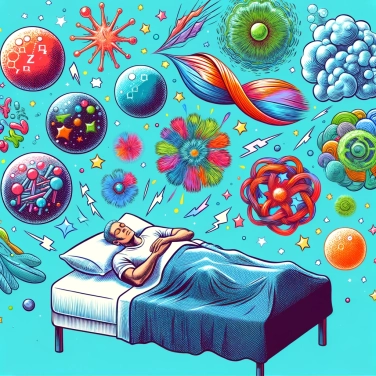Sleep is essential for muscle recovery because it is during this period that the body releases growth hormones, promoting the repair of muscle tissues damaged during physical exercise.

While we sleep, the body produces large amounts of growth hormone (GH), a key substance for repairing and consolidating the muscles stressed by exertion. This hormone directly contributes to the repair of micro-lesions in the muscles, which occur after a workout, and also stimulates the synthesis of muscle proteins. Sleep also affects the secretion of testosterone, which is equally valuable for muscle recovery: it promotes growth and limits the breakdown of muscle fibers. Conversely, sleep reduces levels of cortisol, the hormone responsible for stress, which could hinder the recovery process if it remained elevated for too long. Therefore, getting enough sleep helps the body maintain an ideal hormonal balance for muscle repair and development.
When you sleep, your body is in repair mode, particularly regarding your muscles. During this period, the muscles damaged by exercise undergo an intense repair process: the muscle tissues torn during activity are rebuilt through protein synthesis, stimulated by certain hormones released during the night, notably growth hormone. Specifically, it is mainly at night that your muscles repair themselves, become stronger, and gain mass. Getting enough sleep therefore promotes this muscle reconstruction, while too short or poor-quality nights prevent the muscles from fully recovering and seriously limit their growth.
Deep sleep is THE phase during which your body truly rebuilds itself. During this period, the release of growth hormone skyrockets, thereby promoting the repair of damaged muscle fibers after training. Your muscles then fully benefit from recovery and gain strength. Basically, without this phase, you're missing out on a good portion of the benefits of your training. Your muscle tension decreases, allowing your muscles to fully relax and effectively eliminate accumulated toxins. In short, skipping deep sleep reduces your recovery potential and seriously hinders your progress.
Sleeping little is bad for your muscles. First of all, it raises your cortisol level, the stress hormone, which sabotages your gym efforts by preventing your muscles from recovering properly. Lack of sleep also leads to a decrease in the production of growth hormone, which helps your muscles rebuild after exercise.
In short, if you don't get enough sleep, your muscles recover much less effectively, muscle fatigue accumulates, and your athletic performance declines rapidly. You end up feeling more muscle pain, constantly tired, and more susceptible to injuries. In the long run, you fall behind in your progress, and you risk stagnating or even regressing despite all your training efforts.
To effectively improve your sleep and boost your muscle recovery, start by maintaining a regular sleep schedule—try to go to bed and wake up at the same time every day as much as possible. Establish a relaxation ritual before sleeping: light reading, meditation, or gentle stretching can be your best allies. Also, avoid screens (blue light) at least one hour before bedtime to promote the natural production of melatonin, that nice hormone that helps you fall asleep easily. Also, consider creating a sleep-friendly environment with a dark, cool room (around 18°C is perfect), quiet and comfortable. Avoid heavy meals and stimulants (caffeine, alcohol) in the evening, as they clearly disrupt your deep sleep and thus muscle recovery. Finally, make sure to be active during the day but limit your intense workouts too close to bedtime, so you don't unnecessarily excite your body when it should be winding down.
Taking a short nap (20 to 30 minutes) in the afternoon can boost your post-workout muscle recovery by reducing stress and facilitating quick hormonal optimization.
Sleeping in a cool room between 16° and 19°C promotes deep and restorative sleep, which directly enhances muscle recovery and the release of growth hormones.
Some studies suggest that getting enough sleep (7 to 9 hours per night) can significantly reduce the risk of muscle and joint injuries in athletes, thanks to better tissue recovery.
REM sleep, the phase of dreams, plays a key role in maintaining motor memory and consolidating physical skills learned during your training sessions.
Favor foods rich in tryptophan, such as dairy products, nuts, bananas, and oats. They promote the secretion of melatonin and facilitate better sleep. Avoid heavy or sugary meals before bedtime, as they can disrupt sleep.
The deep sleep phase, also known as slow-wave sleep or phase N3, is considered the most important for muscle recovery. During this phase, the secretion of growth hormone is at its maximum, promoting the repair of muscle tissues.
Naps can be beneficial for recovering from a night of insufficient sleep, but they do not completely replace a full cycle of nighttime sleep. However, a short nap of 20 to 30 minutes can temporarily improve alertness and promote muscle use while also aiding slightly in recovery.
Repeated insufficient sleep can lead to decreased physical performance, reduced muscle recovery, an increased risk of injuries, and a weakened immune system. It can also reduce muscle protein synthesis, which is necessary for muscle repair and growth.
For optimal muscle recovery, it is generally recommended that active adults sleep between 7 to 9 hours per night. High-level athletes or individuals who are very physically active may need more to compensate for intense physical exertion.

No one has answered this quiz yet, be the first!' :-)
Question 1/5